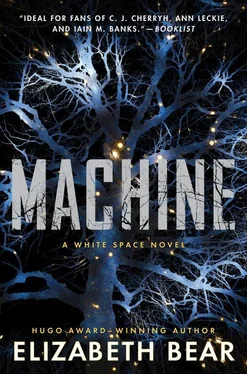I do think it’s ironic that the root meaning of cafeteria is “place to get coffee.”
But I digress. I sat myself beside Helen and settled in.
That was when Dia 25 started to differ from Diar 1, 2, 3, and 4, et cetera. I almost dropped my tea when Helen acknowledged me at once, brightly. “Hello, Dr. Jens! Can I make your day more complete?”
Day, I noticed. Not dia . She really was from a long time ago.
I felt safe beside her. Sally had an override on her programs by then, and had installed a governor. That’s not as oppressive as it sounds. Helen still had free will and consciousness. It was just that if she tried to think about taking violent action against Sally or her crew… she wouldn’t be able to. Sally assured me that Helen’s program was very primitive, by artificial intelligence standards, and that she—Sally—wasn’t at all worried about her ability to control Helen. She’d written herself a routine to do nothing but monitor Helen and the microbots, which she was still keeping quiescent.
“Actually, I came to talk,” I said. “I thought you might be lonely.”
I might have been learning to read the non-expressions on her not-quite-a-face. It seemed that her demeanor lightened. “What would you like to talk about?”
Helen looked up, as if glancing at the ceiling. As if looking for Sally up there. I could read it as nervousness, which led me to swallow a flash of unproductive anger as I thought about the engineer who must have programmed that fragile little gesture of performative subservience into her.
That engineer was possibly frozen in a coffin a couple of meters away, neither determinately alive nor dead until we thawed him out. Schrödinger’s engineer.
Pity calmed me a little without my having to tune.
“What would you like to talk about?” I asked. “I’m tasked to help you assimilate, after all.”
“That other doctor who speaks to me sometimes. It’s an artificial person?” She seemed overawed.
“Sally? Yes. Sally is the ship. She’s an artificial intelligence. A… yes, I suppose you could call her a created person.”
“And she’s allowed to be a doctor ?”
“She’s allowed to be anything she wants to be,” I said. “Or nothing at all, if that’s what she prefers, though I have yet to meet an AI that didn’t get bored if it wasn’t taking on four or five challenging careers simultaneously. They have to pay off their creation, and all Synizens are required to perform a certain amount of government service if their skills are needed. But yes, she’s a pilot, and an astrogator, and a doctor. One of the best doctors I’ve ever met.”
Helen seemed to pause for a long time. It was unusual for an artificial intelligence to take long enough to process something for a human to notice it. With most AIs, I would assume that she was giving me a moment to catch up, or waiting to see if my electrical signals needed a little extra time to feel their way through all that meat. Some of the more social AIs built lag time into their communication so we felt more at home and could get a word in edgewise. With Helen, damaged and primitive as she seemed, I thought she might actually lag that hard.
Helen said, “You say she . Does she have a body somewhere?”
“A peripheral? Not to the best of my knowledge, though a lot of AIs use them. It can be useful to have hands. Some operate waldos, though. Especially surgeons.” I laughed. “And shipminds.”
Helen was looking at me. Just looking. Well, inasmuch as someone without eyes can look. “Are you a created intelligence?”
I spluttered. “No, I’m made of meat, I’m afraid. I was grown in the traditional human way, by combining zygotes in a nutrient bath. Did you think I was a peripheral?”
“I thought—” She reached out and touched my exo with one resilient silver fingertip. It was inobvious, matched to my skin tone, resilient and flexible… but it was still an armature supporting my entire body. I guess I should have expected her to notice.
Nevertheless, I jerked back defensively. Helen recoiled like a cat who had touched something hot.
“You thought?”
“This might be a control chassis.”
We were both, I realized, running full-on into a wall of culture shock and miscommunication. Except Helen probably didn’t even have the concepts to express the dislocation and lack of basic knowledge she was feeling.
I tuned myself back until I stopped hyperventilating. “It’s an adaptive device to help with a pain syndrome. My exo helps me move, and it helps me manage my discomfort.”
Discomfort. That clean medical term that helps you separate yourself from what you’re feeling. Or what the patient is feeling.
Pain.
I didn’t tell her that without it, I wouldn’t be able to stand up under gravity. I didn’t tell her that without it, either I would have to lie around in a haze of chemical analgesics, unable to focus my mind, or I would have to tune my body out to the point that I wouldn’t have been able to rely on my proprioception—and I also wouldn’t have been able to feel it when I nailed my foot into something and broke a toe.
Hell, I wouldn’t have been able to feel it if I nailed my foot to something, full stop.
In the moments when I was struggling to get my reactivity under control, Helen had not spoken. When I looked at her again, she continued as if she had not lagged: “You’re… defective?”
Carefully, I unclenched my fist. She was an archaic, damaged AI—worse, one programmed for utterly different cultural constraints and with hundreds of ans of experience in an environment where those assumptions were never challenged. Where there were no outsiders, and no outsider ideas.
I was starting to think it would be a good idea to look up the backstory on Big Rock Candy Mountain ’s crew demographics, though.
“I have a congenital condition. Would your crew consider me defective?”
“You won’t reproduce, of course,” she said, turning aside. Whoever had programmed her body language had done a good job. Her dropped shoulder and bowed head clearly telegraphed distress and dismay. And submission.
I forced my voice to remain quiet. I would have had to tune to keep it calm. “I already have. My daughter lives on Wisewell with her other mother.”
Life is a funny, terrible thing. We laugh at it because the utter banality of its tragedies renders them constant and unremarkable.
I hadn’t seen my daughter in person since she was eighteen standard months old. My ex-wife did not approve of me accepting a tour of duty rotation that would take me offworld for the whole ten ans. I felt I could not turn it down. For reasons of service and obligation—justifying my existence, if you like, when I’d been told for so long I was a drain on society—and also because I was interested in exomed, and a billet on a Judiciary ship was the best way to get that experience. And to get better medical care. And because getting out of a gravity well for a while seemed like a dream come true, if I were honest.
I’d promised I’d come back at the end of the tour.
I took the reassignment to Core General instead, because I felt like that was a place where I could really be useful. I can’t blame Alessi for cutting me loose when she did. I’d deserved it.
So I talk to my daughter in packets, as much as possible, though sometimes I go a long time without hearing from her. It seems Rache has grown up to be a fine young adult. I might have gone back to Wisewell and sued for partial custody. I might have. I could have gone back after my stint in Judiciary.
But it turned out… I couldn’t.
Not when Core General approved my request for an exo rotation. That was a dream come true, and the opportunity of a lifetime. So few doctors even get to train at Core General—let alone come on staff.
Читать дальше












